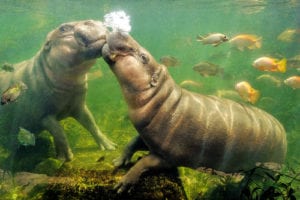 What Can I Do with an Animal Behavior Degree?
What Can I Do with an Animal Behavior Degree?
What kind of career can someone pursue with an animal behavior degree? A degree in animal behavior gives students opportunities to explore many areas of interest regarding animals, including how they choose their mates, how they find and store food, how they reproduce and take care of their offspring, and how they avoid predators, to name just a few. Graduates of animal behavior degree programs can expect to have the skills and knowledge to understand what motivates animals to behave the way they do. Animal behavior majors will have the skills and knowledge needed to improve the quality of life for animals through animal care, research, community education and more.
The career outlook for animal care and service workers is projected to be much higher than average between 2019 and 2029, according to the US Bureau of Labor Statistics. With a predicted 22 percent growth in this field, animal lovers can anticipate opportunities as they enter this field with a degree from an animal behavior program. Not all positions in animal care and service require college degrees, so if you’re looking for a foot in the door for some animal experience before plunging into an animal behavior degree program, you will likely be able to get some experience.
A career that starts with a degree in animal behavior can be a satisfying career path for those who have a love for animals and wish to work closely with them. Employment in this exciting field may require a bachelor’s degree, master’s degree or doctorate and beyond, depending on the job. Keep reading to find possible career paths for graduates of animal behavior degree programs.
Zookeeper
A zookeeper is an animal professional responsible for health maintenance and proper care of the animals and their habitat. Having an animal behavior degree is one degree that may help in this position. Duties of a zookeeper with an animal behavior major may include the feeding and care of animals, medication administration, watching for signs of illness and disease, and monitoring animals for injuries. Physical wellness is important for animals in a zoo, and mental wellness is also important. Keeping the animal habitats clean, safe and stimulating allow the animals to use their natural instincts to keep themselves happy and entertained.
Animal Researcher
An animal researcher, or a zoologist, is someone who specializes in the study of animals. Animal researchers can work in a number of settings, including university laboratories or governmental research settings. Animal researchers often spend time in the field gathering data and studying animals in their habitat. People enter this field with a bachelor’s degree, and a master’s or Ph.D. is necessary to advance to higher level research positions. Animal researchers who specialize in certain kinds of animals have their own names. For example, one who researches birds is called an ornithologist.
Animal Breeders
Animal breeders work to breed animals for specific traits based on genealogy, characteristics and offspring. This job includes breeding animals for certain behavioral traits as well as physical traits. Breeding animals involves keeping detailed records on when animals are in heat, birth intervals, and animal pedigrees. A career as an animal breeder may require understanding of equipment use for artificial insemination. This can be interesting work for graduates of animal behavior schools.
Companion Animal Trainer
Companion animals may be used for company, psychological support and other functions. Animal trainers know how to train and teach animals of all types to display favorable animal behaviors and train them to not exhibit unfavorable behaviors, as well as preparing animals for competition. Animal trainers teach animals to become acquainted with the behavior of humans and to respond to commands. Animal trainers may work with family pets, services animals, or show animals. Companion animal trainers have a background and understanding in animal behavior and typically are patient and have good communication skills. This field is growing at a much greater rate than all other occupations (BLS.gov).
 Animal Behavior Technicians
Animal Behavior Technicians
Animal behavior technicians often work alongside veterinarians to help them in animal behavior cases. Animal behavior technicians may conduct animal socialization classes, work with animal trainers to help clients with specific behavior concerns, and educate clients on behavior modification plans prescribed by their veterinarian. These animal behavior technologists focus on treatment of behavior problems more than prevention of behavior issues in animals. Animal behavior technicians sometimes work in zoos to help animals in their training and enrichment. Some work in shelters to help prevent behavior problems and increase an animal’s adoption potential.
Animal Adoption Specialist
Animal adoption specialists are counselors coordinating the adoption of animals at animal shelters with new owners. Typically, they coordinate adoption of cats and dogs, but sometimes they will be working with other housepets, such as rabbits. People working in this position have a good understanding of animal behavior and have love and empathy for animals. Although a degree is not required for this position, those with a degree in animal behavior would have the understanding to help make adoptions successful.
Pet Store Owner
Owners of pet stores benefit from a background in animal behavior, along with business skills, interpersonal skills and attention to detail. Pet shop owners must adhere to health guidelines, licensing guidelines, and employment laws. Hiring and training competent staff, scheduling workers, managing payroll, and delegating tasks within the store are just some of the things a pet store owner must do. Pet store owners should have a strong interest in animals and maintaining the health of pets.
Veterinary Assistant
Veterinary assistants typically work in veterinary offices, but may work in research at a school, or at an animal shelter. Wherever they work, a degree in animal behavior will help in this rewarding job. Veterinary assistants spent much of their time in kennels, outdoor animal enclosures, labs, and operating rooms. Veterinary assistants work with animals that may be aggressive or frightened, and may be at risk for being bitten or scratched. Animal assistants wear protective gear to protect themselves from injury. They assist in keeping animals healthy by exercising them and restraining them for treatments, feeding and bathing.
Animal Control Officer
Animal control officers work to enforce laws concerning the care and treatment of animals. They work with citizens concerning local animal control issues and patrol public areas, watching for signs of possible animal abuse or distress. Animal control officers help in the maintenance of public safety through the enforcement of animal licensing laws and humane care regulations. Some in this field educate the public about animal behavior and safety. People in this field draw on knowledge from their degree in animal behavior when handling all kinds of wild or domestic animals. Typically, an animal control officer works for a city, county or federal government agency.
Animal Psychologist
Animal psychologists can use their expertise in diagnosing animal disorders that affect mental life and behavior. Animal psychologists are responsible for treatment of animal behavior disorders, health problems, problems encountered in animal living situations, and stressors that possibly affect behavior. Animal psychologists typically work with domestic animals like cats and dogs, but may also work in zoos or with animals in the wild. Entry into this field typically requires a bachelor’s degree, with master’s or doctoral degrees needed for entry into higher-level positions.
Nature Conservation Officer
Nature conservation officers enforce state and federal laws that protect fish and wildlife and other natural resources. Prospective nature conservation officers benefit from an animal behavior degree, along with experience with animals and wildlife. Nature conservation officers typically are employed by state or federal wildlife agencies. Advancement in this position takes people to supervisory and administrative positions, and field training officers. This is a law enforcement position, an excellent position for those that love animals and wildlife and want to promote the public’s enjoyment of the outdoors in a lawful manner.
Wildlife Technician
Wildlife technicians with an animal behavior degree program background may track and tag animals, take aerial surveys, or plant grasses to restore habitats.They may travel by boat, plane, foot, snowshoe or in a land vehicle. Wildlife technicians perform duties to help carry out wildlife and natural areas management plans, and perform duties to gather data regarding animals and their movement and health in their natural environment. Wildlife technicians typically enjoy being in good physical shape and working in the outdoors, and are comfortable with animals. Although they often work independently, they are usually part of a larger team.
Animal Groomer
Animal groomers not only help keep pets looking their best. They also help detect possible health problems in pets. Animal groomers not only take care of fur, teeth and paws, but they are also trained in examining all areas where there may be warning signs of health problems. The Animal groomer may be the first to alert the pet owner to possible health issues, including fur-infesting pests. Since animal groomers are in very close contact with animals, an understanding of animal behavior is essential. Although a degree is not necessarily a prerequisite to this job, a degree in animal behavior will help someone to understand their clients.
Animal Husbandry Managers
Animal husbandry is a branch of agriculture that works with animals raised for meat, milk, eggs, fiber or other products. Daily care for animals, and selective breeding in addition to helping with births and equipment maintenance, makes for an interesting profession. Animal husbandry managers may do the work themselves or oversee workers depending on the size of the operation. A degree in animal behavior provides a helpful background in this important field. People in animal husbandry benefit from having physical strength and ability to work outdoors, accounting and marketing skills, good communication and people skills, and management skills.
Animal Nutritionist
An animal nutritionist would benefit from an animal behavior degree, as they work closely with animals of all types. Animal nutritionists handle animals to determine their body condition and nutritional status by feeling vertebrae, breastbones, and ribs to assess their fat cover and muscle structure. Animal nutritionists sometimes specialize their work with a specific group of animals such as livestock, exotic animals, exotic wildlife, or companion breeds. Some specialize by working with specific species such as cats, dogs, horses or cattle.
Pet Care Associate
Pet care associates work to ensure the health and safety of pets, and assist customers in their purchase of pets that may include dogs, cats, birds, fish and small mammals such as hamsters. A pet care associate will be well versed in the pets they sell, and answer questions their customers have regarding keeping their pets healthy. Often they give advice on pet related products including food. Pet care associates keep cages and fish tanks clean, and make sure their charges are fed in a timely fashion. Although a college degree may not be required, more than a third of pet care associates have a bachelor’s degree. Certainly a degree from an animal behavior degree program provides the knowledge for someone interested in becoming a pet care associate.
Where can I get more information on careers for those with an animal behavior degree?
Here are some places on the web to help you find more information for entering this fascinating and growing field:
The Animal Behavior Society (ABS) provides information on career paths in this fascinating field here.
The Animal Behavior Institute (ABI) provides training information here.
The Academy of Veterinary Behavior Technicians (AVBT) helps students pass the certifying test and can be found here.
The Associate of Animal Behavior Professionals (AABP) can be found here.
By Carol Dolan BS RN BSN CDCES
April 2021
Related: